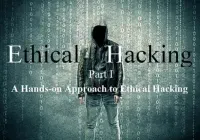
Ethical Hacking - A Hands-On Approach to Ethical Hacking 
This course provides learners with a comprehensive introduction to ethical hacking, teaching the fundamentals of penetration testing and ethical hacking through a hands-on approach. Students will gain practical experience in the areas of white, grey and black hat hacking. ▼
ADVERTISEMENT
Course Feature
![]() Cost:
Cost:
Paid
![]() Provider:
Provider:
Eduonix
![]() Certificate:
Certificate:
No Information
![]() Language:
Language:
English
![]() Start Date:
Start Date:
Self Paced
Course Overview
❗The content presented here is sourced directly from Eduonix platform. For comprehensive course details, including enrollment information, simply click on the 'Go to class' link on our website.
Updated in [March 06th, 2023]
This course, Ethical Hacking - A Hands-On Approach to Ethical Hacking, provides learners with a basic level of competency in ethical hacking. Through a hands-on approach, learners will gain practical experience as a penetration tester or an ethical hacker (white, grey or black). The course will cover topics such as network security, cryptography, malware, and web application security. Learners will also learn how to use various tools and techniques to identify and exploit vulnerabilities in systems. At the end of the course, learners will be able to demonstrate their understanding of ethical hacking and be able to apply their knowledge to real-world scenarios.
[Applications]
After completing this course, learners can apply their knowledge and skills to a variety of tasks, such as assessing the security of a network, identifying vulnerabilities, and developing strategies to protect against malicious attacks. Learners can also use their skills to develop secure applications and systems, as well as to audit existing systems for security flaws. Additionally, learners can use their knowledge to develop secure coding practices and to create secure networks. Finally, learners can use their skills to develop secure policies and procedures for organizations.
[Career Paths]
1. Cybersecurity Analyst: Cybersecurity analysts are responsible for monitoring and protecting an organization’s networks and systems from cyber threats. They use ethical hacking techniques to identify and address potential security vulnerabilities. As the demand for cybersecurity professionals continues to grow, this is an excellent career path for those with the skills and knowledge gained from this course.
2. Penetration Tester: Penetration testers are responsible for testing an organization’s security systems and networks to identify any potential weaknesses or vulnerabilities. They use ethical hacking techniques to simulate real-world attacks and provide recommendations for improving security. This is a great career path for those with the skills and knowledge gained from this course.
3. Security Consultant: Security consultants are responsible for providing advice and guidance to organizations on how to protect their networks and systems from cyber threats. They use ethical hacking techniques to identify potential security vulnerabilities and recommend solutions. This is a great career path for those with the skills and knowledge gained from this course.
4. Cybersecurity Researcher: Cybersecurity researchers are responsible for researching and developing new methods and techniques for protecting networks and systems from cyber threats. They use ethical hacking techniques to identify potential security vulnerabilities and develop solutions. This is a great career path for those with the skills and knowledge gained from this course.
[Education Paths]
1. Bachelor of Science in Cyber Security: This degree program provides students with the knowledge and skills to protect computer networks and systems from malicious attacks. It covers topics such as network security, cryptography, digital forensics, and ethical hacking. Students learn to identify and mitigate security threats, develop secure systems, and respond to security incidents. This degree is becoming increasingly popular as the demand for cyber security professionals continues to grow.
2. Master of Science in Information Security: This degree program provides students with advanced knowledge and skills in the areas of information security, risk management, and cyber security. Students learn to design secure systems, develop secure software, and analyze security threats. They also gain experience in ethical hacking, digital forensics, and incident response. This degree is ideal for those looking to pursue a career in the field of information security.
3. Doctor of Philosophy in Cyber Security: This degree program provides students with the highest level of knowledge and skills in the field of cyber security. Students learn to design secure systems, develop secure software, and analyze security threats. They also gain experience in ethical hacking, digital forensics, and incident response. This degree is ideal for those looking to pursue a career in the field of cyber security research and development.
4. Certificate in Ethical Hacking: This certificate program provides students with the knowledge and skills to become an ethical hacker. Students learn to identify and mitigate security threats, develop secure systems, and respond to security incidents. This certificate is ideal for those looking to gain a basic level of competency in ethical hacking.
Pros & Cons

Excellent

Good

Best Course

Superb

Simple way to learn

Nice

Excellent!!!

None
Course Provider

Provider Eduonix's Stats at AZClass
Ethical Hacking - A Hands-On Approach to Ethical Hacking is the ideal course for those looking to acquire the basic competencies of ethical hacking. This course provides learners with a hands-on approach to gain hands-on experience as a penetration tester or ethical hacker (white, gray, or black). Learners will understand the fundamentals of ethical hacking, including hacking techniques, cybersecurity, cyberattack prevention, ethical hacking tools, and cyberdefense strategies. Through this course, learners will acquire the skills and knowledge needed to identify and mitigate security threats and vulnerabilities.
Discussion and Reviews
0.0 (Based on 0 reviews)
Explore Similar Online Courses

The Complete JavaScript Course: From Zero to Expert!

ANSYS Workbench Tutorial Video Lessons & Training for Beginners and Professionals

Python for Informatics: Exploring Information

Social Network Analysis

Introduction to Systematic Review and Meta-Analysis

The Analytics Edge

DCO042 - Python For Informatics

Causal Diagrams: Draw Your Assumptions Before Your Conclusions

Whole genome sequencing of bacterial genomes - tools and applications

Ryan Montgomery - #1 Ethical Hacker Who Hunts Child Predators Catches One Live On Podcast SRS #56

Become Master in Ethical Hacking with Android (without Root)


Start your review of Ethical Hacking - A Hands-On Approach to Ethical Hacking